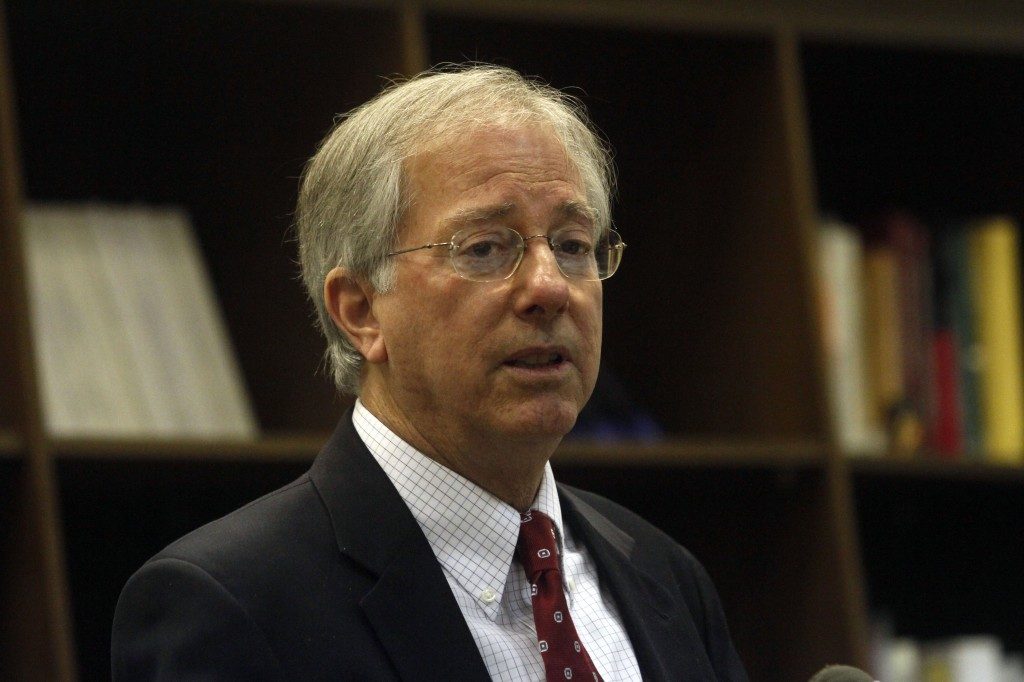Australia/Israel Review
Dennis Ross on the US Peace Plan
Aug 8, 2018 | Tal Schneider

Dennis Ross, who was former US President Bill Clinton’s Middle East envoy and a member of the National Security Council staff with responsibility for the Middle East and the Persian Gulf in the administration of Barack Obama, says that he is convinced of the seriousness of the work of Jason Greenblatt and Jared Kushner, US President Donald Trump’s envoys to the Middle East.
Talking to Globes, Ross relates that he has met Kushner and Greenblatt several times over the past year. “They approached several senior members of previous administrations to hear their positions. I still don’t know what’s in their peace plan and I hope that it will be credible for the other side as well, but on the basis of my conversations with them, I’m convinced that they studied the material well and did serious preparation. As soon as we see the plan itself we’ll know if that’s true of its content as well.”
Ross made a short visit to Israel in late June as part of his work as a consultant to the Arava Institute for Environmental Studies. By coincidence, he was here at the same time as Trump’s two envoys. Kushner and Greenblatt shuttled between Amman, Cairo and Jerusalem, and tried to persuade Arab countries to buy into their initiative, while Palestinian Authority president Mahmoud Abbas (Abu Mazen) continues in his refusal to talk to them.
On the Israeli side, publication of the Kushner and Greenblatt plan is awaited at any moment, and in an attempt to circumvent Abbas’ non-cooperation, Kushner gave an interview to popular Palestinian newspaper Al Quds, in which he attacked the Palestinian leader, saying that the Trump Administration would “likely air the plan publicly” if Abbas remained obdurate. “Now is a time where both the Israelis and Palestinians must bolster and refocus their leadership, to encourage them to be open towards a solution and to not be afraid of trying,” Kushner said.
I asked Ross whether in his opinion there was any possibility of moving forward when everything was stuck vis-a-vis the Palestinians. Kushner and Greenblatt have spent a great deal of time in the region, but since December 2017, when Trump announced that the US Embassy in Israel would be moved to Jerusalem, they have got nowhere with the Palestinians.
“This is the reason that they are focusing on leaders of countries in the region,” Ross answered. “The leaders of the Arab countries won’t put themselves in place of the Palestinians, and they won’t force their positions on the Palestinians either, but they could create a climate that will make it difficult for the Palestinians not to respond.
“So, for example, the leaders of the Arab countries could respond to publication of the plan by stating that they have some questions about it, but that they believe that it’s a serious plan that could represent a basis for negotiations. If this is what the Arab leaders say after the plan’s release, and if the European countries also come out with a positive and supportive reaction, a general context will be created in which Abu Mazen will find it hard to continue to remain silent and ignore it.
“When Kushner and Greenblatt appeared at the UN Security Council and answered questions about the plan [in February 2018], they said ‘both sides are going to love some of it, and hate some of it.’ As long as within the plan there’s enough room for Arab leaders to come out and say that it can serve as a basis for negotiations, and if European leaders echo that and give the plan support, the Palestinians will find it difficult to ignore such global reactions.”

Jared Kushner and Jason Greenblatt: Peace plan “serious”
How did you reach the conclusion that Kushner and Greenblatt’s plan is serious?
Ross: “On the basis of my discussions with them, I’m convinced that what they are doing is serious. The substantive proof is in the plan, and until I see it I won’t know, but the fact is that they wanted to listen, to me too. My conversations with them led me to think that it was a serious plan, and I understand that also from the questions they asked me. It’s clear that they did their homework, and they had meetings with me more than once, and not just with me but with all the sides. They approached people in the region and tried to understand what had worked and what hadn’t worked in previous attempts.”
In Singapore, we saw President Trump go into a room with North Korean Supreme Leader Kim Jong-un, shake hands, and announce ‘That’s it; I’ve solved it.’ Might he use the same tactic here – go into a room with Hamas and say ‘I came, I solved it.’?
“That won’t happen. The Israeli-Palestinian issue is very different from the move with North Korea. There, the move was at the level of the leaders, who had conducted a war of words between them. There was no conflict between the peoples there. On the Palestinian issue, there has been no tough exchange of words between Trump and regional leaders. Unlike in the quick North Korean story, in this case it’s a matter of planning and policy.
“In the end, how the Israeli-Palestinian issue develops depends a great deal on the way in which Kushner and Greenblatt are open with regional leaders, so that they will be able to feel that they have not been surprised. It’s necessary to ensure that the language and formulations in the plan take into account the sensitivities of the sides. Not just what’s in the plan is important, but also what is done in the process before it is published. They must not just publish the plan, but also plan the process of revealing it.”
The Israeli public finds it hard to see the peace plan being realised, both because of years of disagreement, and because we haven’t a clue what’s in the plan.
“Yes, actually one of the things that indicate seriousness is the fact that the plan has not been leaked.”
You said you met with Kushner and Greenblatt. Have you been in contact with Israeli PM Netanyahu in recent years?
“I’ve met with him many times, although not very recently, but over the years. I have a good relationship with him. The meetings were mostly in Jerusalem, and at my request.”
And have you had meetings with leaders of Arab countries?
Ross does not answer the question directly, but points out that in the past few years he has written a monthly column in the newspaper Asharq al-Awsat, an Arabic daily published in London. “I write for them in English and they translate into Arabic, and I think that that’s a sign that indicates change. The fact that they want to read a column from an American, a Jew, who over the years has been identified with the Israeli side. That’s very significant, and I agreed. The interesting thing is that I receive many supportive responses. The column generates a great deal of discussion and I feel that there’s change and progress.”
In what respect?
“They see Israel differently from the way they saw it in the past. In the countries of the region, Israel is no longer seen as a threat, but as a country that acts on what it says. It’s doing things at a time when no-one else is lifting a finger in relation to Iran and Syria. The Jordanians, for example, may perhaps not admit it, but they appreciate Israel’s strength and the fact that it doesn’t just talk but also acts.”
What did you think of the transfer of the US embassy to Jerusalem? Was it intended to shake up the Palestinians and get them moving?
“First of all, I think it’s something that should have happened long ago, and secondly, if you want to co-opt the Arabs into the process, it perhaps shouldn’t have been thrust on them as a surprise. President Trump deferred the transfer several times, and when he didn’t do that it came to them as a surprise, despite his campaign commitment. I have no quarrel with the move itself, but only say that the process that preceded it could have been better. In the end, Jerusalem is the capital of Israel, that’s the reality, and the Administration made clear that the move did not imply a recognition of borders, and that the Palestinians have a right to sovereignty on the basis of negotiations.”
What are you doing these days as a consultant to the Arava Institute?
“The Arava Institute is one of the few places where Israelis, Palestinians and Jordanians work together on concrete projects on water, purification, and waste water treatment. This is a place beyond the talk, of cooperation and action that can have an impact on people’s lives. I try to help in promoting the projects. At the moment, there’s no peace process, and what needs to be done is to restore to all sides the feeling that there are other things that can be done, and the fact that Israelis, Palestinians and Jordanians sit together and try to solve specific problems and to achieve cooperation in order to improve the lives of others – that’s something positive.”
After all these years, do you still hold out hope for the peace process? That it will happen?
“I don’t see any alternative. The Palestinians aren’t going away. Israel isn’t going away. The result of the one-state solution will be a recipe for continued friction. I don’t know if there will be an ‘ultimate deal’ here, but it’s necessary to restore the feeling that the possibility exists that there might be a deal.”
Originally published by Globes [online], Israel business news – www.globes-online.com. © Globes, reprinted by permission, all rights reserved.
Tags: Israel, Palestinians






